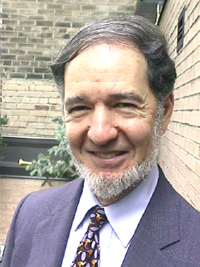Lewis Thomas Prize Lecture
The Rockefeller Institute, New York City
Thursday March 27, 2003
Introduction
At the end of March, Jared Diamond was in New York to receive THE LEWIS THOMAS PRIZE Honoring the Scientist as Poet. The prize was presented to Jared by Thomas P. Sakmar, Acting President, The Rockefeller University.
"Throughout history," states the LEWIS THOMAS PRIZE literature, "scientists and poets have sought to unveil the secrets of the natural world. Their methods vary: scientists use tools of rational analysis to slake their compelling thirst for knowledge; poets delve below the surface of language, and deliver urgent communiqués from its depths. The Lewis Thomas Prize honors the rare individual who is fluent in the dialects of both realms — and who succeeds in spinning lush literary and philosophical tapestries from the silken threads of scientific and natural phenomena — providing not merely new information but cause for reflection, even revelation."
"The Lewis Thomas Prize was established in 1993 by the trustees of The Rockefeller University and presented to Lewis Thomas, its first recipient, that year. Other recipients have been François Jacob (1994), Abraham Pais (1995), Freeman Dyson (1996), Max Perutz (1997), Ernst Mayr (1998), Steven Weinberg (1999), Edward O. Wilson (2000), and Oliver Sacks (2001)."
~~~
Jared is an early and frequent contributor to Edge. In his first feature in 1997 ("Why Did Human History Unfold Differently On Different Continents For The Last 13,000 Years?") he stated:
"I've set myself the modest task of trying to explain the broad pattern of human history, on all the continents, for the last 13,000 years. Why did history take such different evolutionary courses for peoples of different continents? This problem has fascinated me for a long time, but it's now ripe for a new synthesis because of recent advances in many fields seemingly remote from history, including molecular biology, plant and animal genetics and biogeography, archaeology, and linguistics."
Underlying his task is the question of how to turn the study of history into a science. He notes the distinction between the "hard sciences" such as physics, biology, and astronomy — and what we sometimes call the "social sciences," which includes history, economics, government. The social sciences are often thought of as a pejorative. In particular many of the so-called hard scientists such as physicists or biologists, don't consider history to be a science. The situation is even more extreme because, he points out, even historians themselves don't consider history to be a science. Historians don't get training in the scientific methods; they don't get training in statistics; they don't get training in the experimental method or problems of doing experiments on historical subjects; and they'll often say that history is not a science, history is closer to an art.
He comes to this question as one who is accomplished in two scientific areas: physiology and evolutionary biology. The first is a laboratory science; the second, is never far from history. "Biology is the science," he says. "Evolution is the concept that makes biology unique." He continues to bring together history and biology in new and interesting ways to present global accounts of the rise and fall of civilizations.


